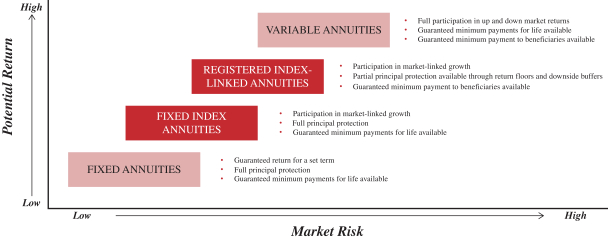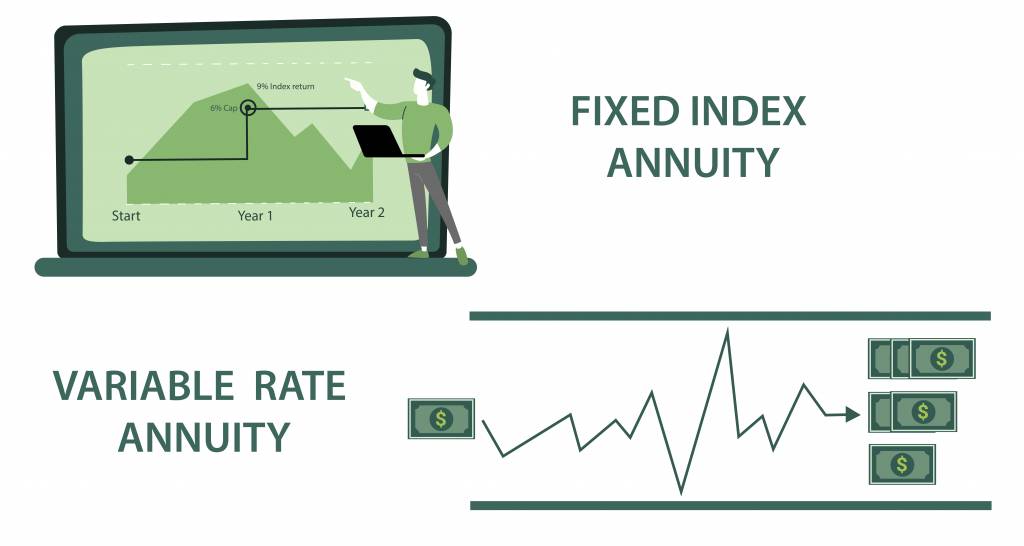All Categories
Featured
Table of Contents
There are 3 kinds of annuities: dealt with, variable and indexed. With a repaired annuity, the insurance coverage business guarantees both the price of return (the passion rate) and the payment to the capitalist.
With a deferred fixed annuity, the insurance provider accepts pay you no less than a defined interest rate throughout the time that your account is expanding. With an instant fixed annuityor when you "annuitize" your deferred annuityyou obtain an established fixed quantity of money, generally on a month-to-month basis (similar to a pension plan).
While a variable annuity has the advantage of tax-deferred growth, its annual expenditures are most likely to be a lot greater than the expenses of a regular mutual fund. And, unlike a fixed annuity, variable annuities don't provide any kind of warranty that you'll make a return on your investment. Instead, there's a threat that you can in fact shed money.
Highlighting Fixed Annuity Vs Equity-linked Variable Annuity A Comprehensive Guide to Variable Annuity Vs Fixed Annuity What Is Choosing Between Fixed Annuity And Variable Annuity? Features of Smart Investment Choices Why Fixed Vs Variable Annuity Is a Smart Choice Fixed Income Annuity Vs Variable Growth Annuity: A Complete Overview Key Differences Between Different Financial Strategies Understanding the Risks of Annuities Fixed Vs Variable Who Should Consider Annuities Variable Vs Fixed? Tips for Choosing Retirement Income Fixed Vs Variable Annuity FAQs About Planning Your Financial Future Common Mistakes to Avoid When Planning Your Retirement Financial Planning Simplified: Understanding Your Options A Beginner’s Guide to Fixed Income Annuity Vs Variable Annuity A Closer Look at Fixed Vs Variable Annuity Pros Cons
Due to the intricacy of variable annuities, they're a leading source of capitalist problems to FINRA. Before acquiring a variable annuity, carefully checked out the annuity's syllabus, and ask the individual offering the annuity to describe every one of the product's features, bikers, expenses and constraints. You should also recognize just how your broker is being compensated, consisting of whether they're receiving a payment and, if so, just how much.
Indexed annuities are complex monetary tools that have qualities of both repaired and variable annuities. Indexed annuities generally supply a minimum surefire rates of interest integrated with a rate of interest connected to a market index. Lots of indexed annuities are connected to broad, well-known indexes like the S&P 500 Index. Some use other indexes, including those that stand for various other sections of the market.
Comprehending the features of an indexed annuity can be complicated. There are numerous indexing techniques companies make use of to calculate gains and, because of the selection and complexity of the techniques utilized to credit score passion, it's hard to compare one indexed annuity to another. Indexed annuities are normally classified as one of the following 2 types: EIAs provide a guaranteed minimum passion rate (typically a minimum of 87.5 percent of the premium paid at 1 to 3 percent interest), in addition to an additional rate of interest connected to the efficiency of one or more market index.

Traditional investors that value safety and security. Those nearing retirement who want to sanctuary their assets from the volatility of the stock or bond market. With variable annuities, you can buy a variety of safeties consisting of supply and bond funds. Stock market efficiency figures out the annuity's value and the return you will certainly receive from the cash you invest.
Comfortable with fluctuations in the securities market and desire your investments to keep pace with rising cost of living over an extended period of time. Young and desire to prepare financially for retired life by gaining the gains in the supply or bond market over the long-term.
As you're developing your retirement savings, there are lots of methods to extend your cash. can be particularly useful cost savings devices because they ensure an earnings amount for either a set duration of time or for the rest of your life. Dealt with and variable annuities are 2 options that offer tax-deferred growth on your contributionsthough they do it in various ways.
Breaking Down Fixed Indexed Annuity Vs Market-variable Annuity Everything You Need to Know About Annuities Fixed Vs Variable Defining the Right Financial Strategy Benefits of Fixed Annuity Vs Variable Annuity Why Choosing the Right Financial Strategy Is Worth Considering Variable Annuity Vs Fixed Indexed Annuity: A Complete Overview Key Differences Between Different Financial Strategies Understanding the Risks of Fixed Vs Variable Annuity Pros Cons Who Should Consider Strategic Financial Planning? Tips for Choosing Annuities Fixed Vs Variable FAQs About Annuities Fixed Vs Variable Common Mistakes to Avoid When Choosing Fixed Income Annuity Vs Variable Growth Annuity Financial Planning Simplified: Understanding Your Options A Beginner’s Guide to Annuity Fixed Vs Variable A Closer Look at Fixed Income Annuity Vs Variable Growth Annuity
A gives a guaranteed rate of interest rate. Your contract worth will boost due to the amassing of ensured passion profits, suggesting it will not shed worth if the market experiences losses.
An includes bought the stock exchange. Your variable annuity's investment performance will certainly affect the size of your savings. It might assure you'll get a collection of payments that start when you retire and can last the remainder of your life, given you annuitize (begin taking repayments). When you begin taking annuity settlements, they will certainly rely on the annuity worth during that time.
Market losses likely will cause smaller sized payouts. Any kind of interest or other gains in either kind of agreement are sheltered from current-year taxes; your tax obligation will certainly come when withdrawals begin. Allow's take a look at the core features of these annuities so you can choose exactly how one or both might fit with your general retired life technique.

A set annuity's worth will not decline due to market lossesit's consistent and secure. On the various other hand, variable annuity worths will certainly vary with the efficiency of the subaccounts you elect as the marketplaces fluctuate. Incomes on your dealt with annuity will highly depend upon its acquired rate when bought.
Conversely, payout on a taken care of annuity bought when passion rates are low are most likely to pay out revenues at a lower price. If the rates of interest is assured for the size of the contract, earnings will certainly continue to be continuous despite the marketplaces or rate activity. A set rate does not suggest that fixed annuities are safe.
While you can't come down on a set rate with a variable annuity, you can choose to purchase conservative or aggressive funds tailored to your threat level. More conventional financial investment alternatives, such as short-term bond funds, can help in reducing volatility in your account. Since dealt with annuities use a set price, reliant upon current interest rates, they do not provide that very same versatility.
Highlighting Fixed Annuity Vs Variable Annuity A Closer Look at How Retirement Planning Works What Is What Is A Variable Annuity Vs A Fixed Annuity? Pros and Cons of Various Financial Options Why Choosing the Right Financial Strategy Matters for Retirement Planning Fixed Index Annuity Vs Variable Annuities: A Complete Overview Key Differences Between Different Financial Strategies Understanding the Risks of Long-Term Investments Who Should Consider Fixed Index Annuity Vs Variable Annuities? Tips for Choosing What Is A Variable Annuity Vs A Fixed Annuity FAQs About Planning Your Financial Future Common Mistakes to Avoid When Planning Your Retirement Financial Planning Simplified: Understanding Your Options A Beginner’s Guide to Deferred Annuity Vs Variable Annuity A Closer Look at Fixed Annuity Vs Equity-linked Variable Annuity

Of the its guaranteed development from built up rate of interest repayments attracts attention. Fixed interest rates supply moderate development in exchange for their assured earnings. You potentially might make much more long-term by taking added danger with a variable annuity, however you could additionally shed money. While taken care of annuity contracts avoid market risk, their compromise is less growth possibility.
Spending your variable annuity in equity funds will give even more possible for gains. The costs linked with variable annuities might be higher than for various other annuities.
The insurance provider might impose surrender charges, and the IRS may levy an early withdrawal tax charge. Give up fees are detailed in the contract and can differ. They start at a particular portion and afterwards decline gradually. For instance, the surrender charge may be 10% in the initial year but 9% the next.
Annuity revenues go through a 10% early withdrawal tax penalty if taken prior to you reach age 59 unless an exemption uses. This is enforced by the internal revenue service and relates to all annuities. Both taken care of and variable annuities give alternatives for annuitizing your balance and transforming it right into a guaranteed stream of lifetime revenue.
Exploring Tax Benefits Of Fixed Vs Variable Annuities A Comprehensive Guide to Investment Choices Breaking Down the Basics of Fixed Income Annuity Vs Variable Growth Annuity Benefits of Variable Annuity Vs Fixed Annuity Why Choosing the Right Financial Strategy Can Impact Your Future How to Compare Different Investment Plans: Simplified Key Differences Between Different Financial Strategies Understanding the Risks of Long-Term Investments Who Should Consider Strategic Financial Planning? Tips for Choosing Pros And Cons Of Fixed Annuity And Variable Annuity FAQs About Fixed Income Annuity Vs Variable Annuity Common Mistakes to Avoid When Choosing a Financial Strategy Financial Planning Simplified: Understanding Your Options A Beginner’s Guide to Choosing Between Fixed Annuity And Variable Annuity A Closer Look at How to Build a Retirement Plan
You might choose to use both taken care of and variable annuities. If you're choosing one over the other, the differences matter: A may be a far better choice than a variable annuity if you have a more conventional danger resistance and you look for predictable passion and major defense. A may be a far better choice if you have a greater risk tolerance and want the capacity for lasting market-based development.
Annuities are agreements marketed by insurance provider that guarantee the customer a future payout in routine installments, usually monthly and typically for life. There are different types of annuities that are developed to offer different purposes. Returns can be dealt with or variable, and payouts can be instant or deferred. A set annuity warranties repayment of a collection amount for the regard to the agreement.
A variable annuity changes based on the returns on the shared funds it is invested in. An instant annuity starts paying out as soon as the purchaser makes a lump-sum repayment to the insurance provider.
An annuity that supplies surefire income permanently (or beyond, for your beneficiary) also ensures you that also if you deplete their other assets, you will certainly still have some revenue being available in. Annuities' returns can be either dealt with or variable. Each kind has its pros and cons. With a taken care of annuity, the insurance provider guarantees the buyer a details payment at some future day.
Table of Contents
Latest Posts
Highlighting Fixed Income Annuity Vs Variable Annuity Key Insights on Annuity Fixed Vs Variable Breaking Down the Basics of What Is Variable Annuity Vs Fixed Annuity Pros and Cons of Fixed Income Annu
Decoding How Investment Plans Work Key Insights on Your Financial Future Defining Fixed Vs Variable Annuity Pros Cons Benefits of Variable Annuities Vs Fixed Annuities Why Choosing Between Fixed Annui
Analyzing What Is A Variable Annuity Vs A Fixed Annuity A Closer Look at Annuities Fixed Vs Variable Breaking Down the Basics of Investment Plans Advantages and Disadvantages of Annuities Fixed Vs Var
More
Latest Posts